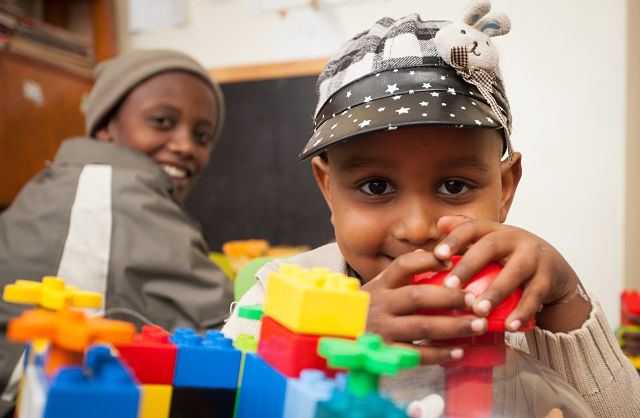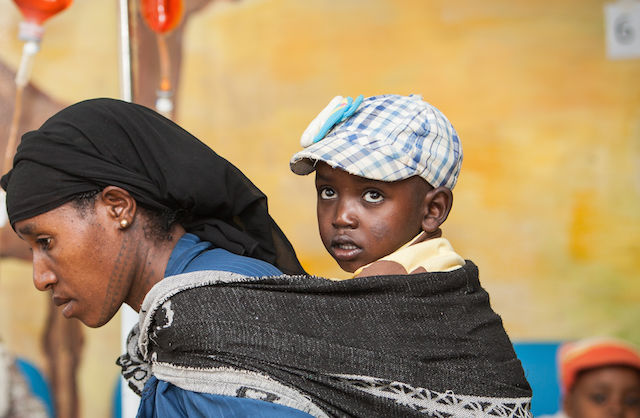 Photo at Tikur Anbessa Hospital (TAH) Pediatric Cancer Center in Addis Ababa. (Courtesy of the Aslan Project)
Photo at Tikur Anbessa Hospital (TAH) Pediatric Cancer Center in Addis Ababa. (Courtesy of the Aslan Project)
Tadias Magazine
By Tadias Staff
Published: Sunday, July 24th, 2016
The Aslan Project: Focus on Pediatric Cancer Health System in Ethiopia
New York (TADIAS) — A few years ago two children from Ethiopia, Temesgen Gamacho and Eyoel Fanta, were pediatric cancer patients at Georgetown University Hospital in Washington, D.C. when the unthinkable happened for their parents and loved ones. Both children did not survive their illness. Eyoel had been diagnosed with lymphoblastic leukemia, which was one of the most curable pediatric cancers. The loss of these two children drove their physician, Dr. Aziza Shad, who was Chief of Pediatric Hematology/Oncology at Georgetown Hospital at the time, to launch The Aslan Project in Ethiopia in 2012 and jumpstart a large-scale commitment to set up a world-class cancer treatment program for children in Ethiopia.
Fast forward to 2016 and that dream has become a reality on the ground through an international network of volunteer pediatric cancer specialists and parents who are behind Ethiopia’s new Pediatric Hematology/Oncology programs at Tikur Anbessa (Black Lion) Hospital in Addis Ababa as well as at Jimma University Hospital.
In an interview with Tadias from Washington, D.C. Julie Broas, Executive Director of The Aslan Project, said “in addition to giving children a chance to survive a curable cancer the organization’s mission was to provide equitable access for families in low-resource settings to high standard local treatment.” Broas added: “What we chose to do in Ethiopia is to focus on medical education and training of doctors, nurses, and pharmacists, because that’s how you would build a comprehensive program that’s locally supported and sustainable.”
Broas, whose daughter is a cancer survivor, said she knows first hand “the great grief and agony” of parents around the world who yearn for the best treatment for their children. “I want people in low-resource settings to have the same opportunities that I have in this country,” she said.
The program in Addis Ababa is now being managed by Dr. Daniel Hailu Kefeni, one of the first graduates of the pediatric cancer fellowship set up by The Aslan Project three year ago at Tikur Anbessa Hospital.
Dr. Tenagne Haile-Mariam of the Department of Emergency Medicine at George Washington University Hospital, who is also a board member of the The Aslan Project, pointed out that in addition to “the allied healthcare professionals such as doctors, nurses and other support within the unit, an effective system must also have all other related services that can support such treatment, including pathologists, laboratory services and pharmacists.”
“When we say ‘locally trained’ we want people to understand that we are talking about implementing the highest of international standards,” Dr. Tenagne explained. “They are tested by the same people that do testing all over the globe. So you are putting a staff in place that’s locally trained and internationally vetted. And what that means is that they will have colleagues all over the world whom they can consult and converse with scientifically, they can stay up-to-date as new research comes in their field, but also it puts them in a position where they can conduct their own locally relevant and internationally approved research. This what makes it a sustainable program.”
“The whole Aslan model is that you improve and work through the kinks of the system as you are teaching and training local staff,” added Dr. Tenagne. She emphasized that improvement of the program includes upgrading the physical plant “because in order to have a care unit you have to have an area where you can deliver an appropriate care.”

(Photo: Courtesy of the Aslan Project)
Dr. Tenagne reiterated that “the key is to create a whole system that’s linked to locally existing initiatives, not a situation where you can just send a doctor and say ‘go at it’ because they will fail,” she said. “This is why The Aslan Project is a catalytic program, because in order to implement it you have to put into place not just the right people, but you have to put them in a system where they can work in order to ensure sustainability.”
Last month The Aslan Project hosted a successful fundraiser in New York City co-hosted by Ethiopian American Attorney Jote Kassa, who is Managing Director at J.P.Morgan Private Bank. Broas and Dr. Tenagne said they encourage involvement not only from medical professionals but anyone interested in addressing the much needed pediatric cancer treatment center in Ethiopia. Dr. Tenagne said The Aslan Project’s next fundraiser will be held in Washington D.C. around Ethiopian New Year in September.
—
You can learn more and supprt the The Aslan Project at www.aslanproject.org.
Join the conversation on Twitter and Facebook.

























